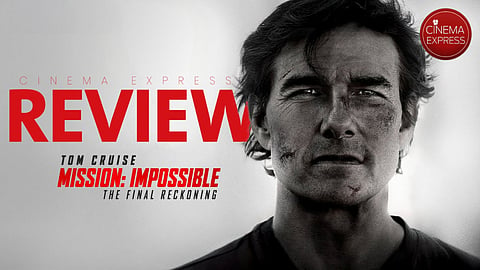Mission: Impossible – The Final Reckoning Movie Review: An intense exploration of the freewill vs determinism debate
Mission: Impossible – The Final Reckoning (4 / 5)
Beyond prosthetic face masks, curious gadgets, seemingly impossible missions, and Tom Cruise himself, the Mission: Impossible franchise, from its first entry in 1996, has always been about choices. In every film, under extraordinary circumstances, while it is apparent that there is no other choice but those in favour of the antagonistic forces, Ethan Hunt fearlessly jumps into the unknown and proves that the right choice is never out of the question. He will use a bomb explosion to propel himself onto a moving train, strap himself to a flying plane, scale the walls of the tallest building in the world, HALO jump through a thunderstorm, swim several feet underwater to find a submarine wreckage, all because he refuses to accept that he has run out of choices to make. And he finally meets his biggest match in The Final Reckoning: An all-seeing, misanthropic Artificial Intelligence which aims to fold the endless ocean of possibilities into a single deterministic path that leads to the annihilation of humanity. The ‘unstoppable force (Ethan Hunt) meets the immovable object (The Entity)’ narrative makes this eighth instalment the most thematically probing entry in the franchise. We get a deeper exploration of Ethan Hunt’s core personality, which also happens to be the principal ethos of the Mission: Impossible franchise, best reflected in one of the most recognisable lines in cinema history: “Your mission, should you choose to accept it…”
Director: Christopher McQuarrie
Cast: Tom Cruise, Hayley Atwell, Ving Rhames, Simon Pegg, Henry Czerny, Angela Bassett
It is not entirely wrong to experience Mission: Impossible as just an ever-inflating action franchise with increasingly cartoonish set pieces with every entry. However, The Final Reckoning takes a slightly different, focused approach. It brings back the mood of the Cold War-era espionage thrillers that the original film extracted its DNA from. In the place of flashy explosions and high-octane car/bike/aircraft chases, we get quieter, tense moments. We do get the customary gun fights, close combat action, and Ethan Hunt hanging off a plane (again). But what stays with us the most are those moments that push our nerves to the limit. Whether it is Ethan Hunt trying to hopelessly cut himself off a submarine falling off a cliff that is already several feet underwater or the US president’s hand hovering above the red button that would launch nuclear warheads and start World War III, the film opts for pronounced intensity over flashy, extravagant stunts. It is interesting how whenever you find yourself on the edge of your seat, it is because of the narrative, and not because you’re awed by the production, choreography, and execution. It does feel like Tom Cruise takes a step back to let Ethan Hunt shine, perhaps to show that he doesn’t use Hunt as a mere prosthetic face mask to perform daring stunts. It seems that he actually understands and respects the character enough to let Hunt’s ideals take the centre stage instead of being overshadowed by the demands to make the finale a large-scale spectacle.
As the film delivers a rousing, satisfying send-off to Ethan Hunt and his crew towards the end, it is easy to forget how we were made to trudge through the dense exposition for the first hour. The pacing seems odd at the beginning, scenes stretch more than they should, and we get a summary of all the previous films at least more than once. What puzzles you more are the needlessly elaborate callbacks to the recent Dead Reckoning. We definitely did not need to see how the nameless Russian submariners died, right as Ethan Hunt is busy dodging falling torpedoes. Most of the other exposition seems like a consequence of the complex storytelling. If we need to understand why Hayley Atwell’s character has to wait for Ethan to insert a drive into another device so she can cut a wire and then pull out a super advanced memory chip in less than 100 milliseconds, maybe we do need ten minutes of the characters explaining it. There are several such moments, and it would have been exhausting if not for Tom Cruise’s exceptional performance. A poignant conversation between Luther (Ving Rhames) and Ethan Hunt is one of the most emotionally heavy scenes in the franchise. So much is conveyed through shadows and subtlety.
SPOILERS AHEAD
The Final Reckoning is proof that Mission: Impossible is more than just an action franchise full of extraordinary stunts. It is about the triumph of free will over determinism, and the conviction it requires to make the right choice in the face of overwhelming odds telling you it’s impossible. While it might sound like a typical ‘hero-elevation’ moment to hear characters, at several instances, telling Ethan Hunt that he is ‘destined’ to control The Entity or ‘destined’ to save the world, the film ultimately leaves a lingering message against the deterministic shackles of destiny. Even Ethan refuses to accept the tag of a ‘destined’ saviour. This is perhaps why, after Ethan takes control of The Entity at the end, we do not see what he does with it. The story itself liberates him of the constraints of choice, he could have chosen to do anything with it, the possibilities are endless now. As Luther says, “Nothing is written,” and maybe that is precisely why Ethan Hunt is finally free.

